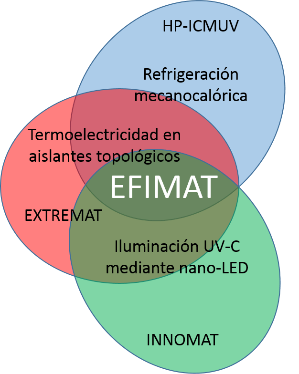EFIMAT
The sources of ultraviolet light (UV-C) are essential for a number of industrial and medical applications, such as food disinfection. Compared to traditional solutions, based on mercury lamps, UV LED light has many potential advantages: absence of toxic materials, large spectral range emission, millimeter sizes and reliability. The ternary alloy AlGaN offers ideal characteristics for the development of new UV-C sources. The project EFIMAT will significantly contribute to the development of UV LEDs through the study of doping, alloy homogeneity and the optoelectronic characteristics of AlGaN semiconductor nanowires. Such innovative nanostructures have the ability to overcome the difficulties presented by current UV LEDs, based on thin layers.
In the field of refrigeration, new nano-electronic devices demand compact and efficient solutions that do not find an adequate response among traditional technologies. Solid state refrigeration based on advanced mechanocaloric materials represents a new and elegant answer to these difficulties. These are materials in which the application of pressure or mechanical stress causes a change in temperature. EFIMAT will boost the study of the fundamental properties of materials with giant mechanocaloric properties based on fast ion conductors as an indispensable requirement to relate its cooling capacity with changes in its crystalline structure.
In a world with a growing demand for energy, the use of waste heat by thermoelectric generators is a sustainable way to maintain the current rate of electricity consumption. This objective requires the development of high-efficiency thermoelectric materials that will allow, in addition to the production of electrical energy, heating and cooling by means of environmentally sustainable devices, without moving parts, silent, reliable, scalable and free of polluting emissions. The project EFIMAT proposes the study of new, highly efficient thermoelectric materials taking advantage of the properties of topological insulators. These are quantum materials in which the surface and volume electronic states are intrinsically different.
In summary, EFIMAT aims to make a quantum leap in the use of energy through innovative but realistic proposals that take advantage of the synergy of three excellent research groups with complementary expertise: EFIMAT aims to develop advanced materials (UV-LED, materials with giant mechano-caloric effect and thermoelectric materials based on topological insulators) for efficient energy applications highly demanded by industry and society. These applications will allow our socio-economic environment to be at the forefront of efficient energy solutions.
Ana Cros
INNOMAT (Universitat de València): Ana Cros, Núria Garro, Rafael Ibáñez
HP-ICMUV (Universitat de València): Daniel Errandonea, David Santamaría, Chantal Ferrer, Domingo Martínez, Julio Pellicer
EXTREMAT: (Universitat Politècnica de València): Javier Manjón, Óscar Gomis, Rosario Vilaplana
With the collaboration of: Bruno Daudin (CEA-Grenoble), Claudio Cazorla (UNSW, Australia), Cestmir Drasar (Univ. Pardubice, Czech Republic), Malcolm I. McMahon (Univ. Edinburgh, United Kingdom).
Generalitat de València
- GVA - PROMETEO - Research groups of excellence











